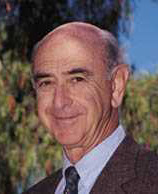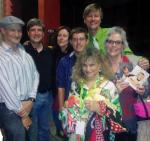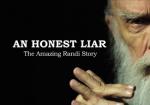By Carol and Ben Baumgartner
 Wally Sampson It is with deep sadness that we announce the passing of our admired and beloved friend, Wallace Ira Sampson, M.D., “Wally”, on May 25, 2015 at Valley Medical Center in San Jose.
Wally Sampson It is with deep sadness that we announce the passing of our admired and beloved friend, Wallace Ira Sampson, M.D., “Wally”, on May 25, 2015 at Valley Medical Center in San Jose.
A staunch supporter of science-based medicine and a founding member of Bay Area Skeptics, Dr. Sampson, an oncologist, became interested in pseudo-science in 1972 when he became aware of cancer patients turning to Laetrile for treatment. He became an expert on dissecting false medical claims such as homeopathy, acupuncture, chelation therapy, chiropractic, acupuncture, and traditional Chinese medicine. Wally was a prominent and highly respected defender of science in health care education and practice, and is considered a mentor by many well-known skeptics working to combat medical pseudoscience, including Harriet Hall, David Gorsky, and Steve Novella. His article “Why the National Center for Complementary and Alternative Medicine (NCCAM) Should be Defunded”, written in 2003, is as relevant today as then (
Dear Fellow Skeptics: I'm happy to announce that I've started a new podcast on science and skepticism called ShelShocked. Each week, we'll bring you another one-hour program on a topic from science, skepticism, or a related topic. In our first episode, we discuss morality and bigotry, and even have a special interview with my friend Michael Shermer about his new book, "The Moral Arc." Please CLICK HERE, and let us know if there's a topic you'd like us to cover in a future episode. -- Sheldon UPDATE: Due to job and other obligations, Amanda has left the podcst as co-host. She will check in from time to time to let us know what's going on in the skeptic community in Australia. In the meantime, I have found a new co-host in the form of psychologist (and Bay Area Skeptics member) Marilin Colón. Marilin has spoken at our SkepTalk events before, and is a valued member of the adjunct faculty at CSU East Bay, as well as Ohlone College. Hey, all! The JREF announced yesterday the publication of a new critical thinking resource in the form of "Magic in the Classroom - Using Extraordinary Claims to Teach Critical Thinking," a FREE e-book. It can be enjoyed by laypeople, but we're hoping it will also be picked up by educators and utilized in the classroom to encourage critical thinking. This book is the culmination of work by a dozen educators from numerous disciplines; I'm proud to say that three of the chapters are from me! CLICK HERE to visit the download page. It's available in Kindle, iPad, and PDF. Here's a good piece on Bay Area vaccination statistics, from this morning's SF Chronicle. One of the few articles I've seen that explores the nuances of refusal -- it goes beyond "gee, unvaccinating parents are all ignorant/selfish/health nut/California hippies/[insert pejorative of choice here]". I've always thought that for very many non-vaccinators, the main motivator was fear for the health/comfort of the child, and concern about the number and scheduling of vaccinations, rather than "vaccines are poison" mentality. That is a catchier meme for the press, though, and gets more eyeballs. Plus, few articles explore under vaccination, which doesn't necessarily rest with an ideological objection to vaccination and can be just that busy parents don't get around to the full sequence, second innoculation, etc. You must subscribe to the SF Chronicle online to read the full article HERE. One of the most annoying parts of the "world of woo" is people who claim to have psychic powers. Although none has ever actually shown evidence of this ability under strict observation, it's a multi-million dollar business, with some in the field becoming quite prominent. Chip Coffey may not be one of the biggest players, but he's had his 15 minutes of fame with A&E's "Psychic Kids" program and a few other television appearances. Please CLICK HERE to be taken to my latest article on Randi's "Swift" blog. In it, I detail the success of this project, dubbed "Operation Bumblebee." The brainchi
I hope that each person reading this article can, someday, have a weekend like the one I just experienced. It was, as the kids say, epic. Earlier this month, I got a message from my friend, the filmmaker Tyler Meason, letting me know that he’d be in San Francisco on Sunday, June 15th for the screening of “An Honest Liar,” the documentary he co-created with Justin Weinstein that chronicles the life of world-renowned magician and skeptic, James “The Amazing” Randi. I purchased tickets and said that I would see him there. A few weeks passed, and I got another message from Tyler, this time letting me know that James Randi himself would be attending the screening, and suggesting that I look into asking him to make an appearance for the Bay Area Skeptics. Excited about the possibility, I was eventually able to contact Randi’s husband, the artist Deyvi Peña. As it turns out, Randi was delighted by the invitation, and agreed to show up to an informal meet-and-greet the day before the screening. I explained that this wou
(Reprinted from the National Center for Science Education.) Acts & Here at NCSE, we maintain a subscription to Acts & Facts to remain informed of the ICR’s stance on various topics and as a reminder of what we face in defending science education. The May 2014 issue has an article by Dr. Jason Lisle—ICR's Director of Research—that is a case study in avoiding worry and shirking responsibility by donning blinders in adopting a human-centric view of the universe. (N.B. Blinders are those bridle attachments on racehorses to keep them from looking to the side and becoming distracted or ‘spooked.’ The Aussies call them pacifiers. ) Dr. Lisle has been contributing a series of articles to
In this column he nails a Portland official for ridiculously draining 38 million gallons of water because someone allegedly urinated in it. That's 3 parts/billion: a lower level than permitted for arsenic. But read the rest of the article for a very satisfying description of how science works, why it's important to pay attention to it, and why "science is a linchpin of modern society". I sure wish he'd be willing to speak some year for SkeptiCal. (And do you have your ticket yet?) Are you all "wrapped up" over the stress of the holiday season? If so, it may help to turn to science to make your holiday experience a bit less stressful... In my latest article on James Randi's "Swift" blog, I investigate some helpful tips from social science research that, if applied, can make your days a bit merrier and brighter. Wondering how to buy that perfect gift for a loved one (or why others always seem to buy you things you don't like)? Hoping to avoid going into debt without disappointing the family? Trying to deal with the stress of holiday cooking using rather limited culinary skills? Then CLICK HERE to read my take on the psychology of the perfect holiday season. After bringing home their colorful, sugar-laden bounty from a successful night of Trick or Treat, millions of American When kids are “bouncing off the walls,” it's not uncommon to hear parents call a temporary halt to all sugar consumption in an effort to save their sanity. One of the most pervasive myths in parenting, the belief that sugar promotes hyperactivity, this connection is solidified in the minds of millions of parents (Ghanizadeh & Zarei, 2010), reinforced at Halloween by one of the most persuasive types of evidence: their own children’s behavior. But, as we skeptics know, personal experience isn’t always the best indicator of reality. Let’s take a
New ShelShocked Podcast Airs…
 My co-host for this endeavor is the lovely Amanda Devaus, of the Canberra Skeptics in Australia.
My co-host for this endeavor is the lovely Amanda Devaus, of the Canberra Skeptics in Australia.
New eBook: Magic in the Classroom from JREF…
 JREF eBook
JREF eBook
 Mom & Baby
Mom & Baby
 Operation Bumblebee (San Jose) A group of us wanted to see whether we could trick him into communicating with dead people who don't actually exist. So after a lot of work and planning, we did just that.
Operation Bumblebee (San Jose) A group of us wanted to see whether we could trick him into communicating with dead people who don't actually exist. So after a lot of work and planning, we did just that.
My Magical Weekend With James Randi…
 An Honest Liar
An Honest Liar
Acts & Facts & Pacifiers
 Chelyabinsk meteor. © 2013 Alexandr IvanovFacts is the monthly publication of the Institute for Creation Research, which equips “believers with evidence of the Bible’s accuracy and authority through scientific research…”
Chelyabinsk meteor. © 2013 Alexandr IvanovFacts is the monthly publication of the Institute for Creation Research, which equips “believers with evidence of the Bible’s accuracy and authority through scientific research…”
“I fear the coming of the Big Stupid”
 Jon CarrollJon Carroll understands, promotes, and appreciates science, which we in the Bay Area can be grateful for. CLICK HERE to read Jon's excellent article in the SF Gate, "OMG, What Is In Your Drinking Water."
Jon CarrollJon Carroll understands, promotes, and appreciates science, which we in the Bay Area can be grateful for. CLICK HERE to read Jon's excellent article in the SF Gate, "OMG, What Is In Your Drinking Water."
The Psychology of the Perfect Holiday Season
 Happy Holidays
Happy Holidays
 Happy Halloween children will spend the coming weeks locked in a battle of wills with their parents over how much of the spoils they are allowed to enjoy, and how often they'll have access to it. One of the most common strategies parents employ, based upon a supposed connection between sugar and hyperactivity, will ensure that parents lose that battle...at least, in a scientific sense.
Happy Halloween children will spend the coming weeks locked in a battle of wills with their parents over how much of the spoils they are allowed to enjoy, and how often they'll have access to it. One of the most common strategies parents employ, based upon a supposed connection between sugar and hyperactivity, will ensure that parents lose that battle...at least, in a scientific sense.
